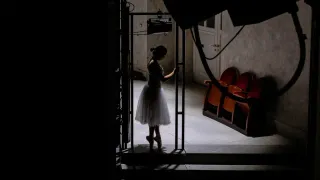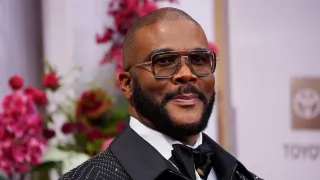October 12, 2024
The Making of 'The Apprentice,' in Their Words
Jake Coyle READ TIME: 7 MIN.
Capturing complexity (with cheeseballs)
Jeremy Strong: Cohn is a complicated figure whose long dark shadow extends to 2024 and this historical election. I was fascinated by Cohn and the paradoxes of him. He was beloved as much as he was reviled. He had a roomful of stuffed frogs. In terms of a sociological, anthropological study, I find him to be a completely fascinating character. My own judgments have to be left at the door. But it was like peering into the heart of darkness.
Sebastian Stan: I don't think any of us are above it. I don't think any of us are born perfect people or we're not morally compromised. It's really, really much muddier and trickier than that, life is. I think the only way we can learn is through empathy. We have to protect empathy and continue to nourish it. And I think one way of nourishing empathy is showing what it's exact opposite can be.
Ali Abbasi: I've been hearing a lot: Let's make a movie about the Second World War or the Civil War – just go back in time. They say a Civil War movie is a good metaphor for the way our society is now. I'm like: Our society is extremely exciting, complex, complicated, has huge problems and opportunities. Why not address them? We have a (expletive) responsibility.
Jeremy Strong: There would be times where I'd be talking about "Succession" and I'd think of that thing attributed to Emerson where he said, "Any institution is the shadow of a man." And I would think of that in terms of Logan Roy, but I can also think of that in terms of Roy Cohn. I can draw a line between those two, certainly. Rupert Murdoch is at a party at Roy's house on 68th Street in the film, and Roy and Rupert did a lot of business together. In some ways I'm a Zelig around these subjects and themes.
Ali Abbasi: There were days where I was like, "Why is Jeremy not looking at me? Does he hate me?" Oh, he's in character.
Sebastian Stan: There's a scene in the movie in Atlantic City and Roy's saying what he's saying and Donald is eating cheeseballs. Ali shot this movie, you just never knew where the camera was going to be from take to take. So we did many, many takes. A lot of the movie was improvised. I must have had, like, 25 to 30 cheeseballs that night. The next morning I woke up and, I'm sorry to say, but I was on the toilet at 6:30 in the morning before I was getting picked up. And I was in such pain. I couldn't leave that toilet. It was like: Yeah, I guess this is Method acting.
Seeking a Distributor
Ali Abbasi: I'm a little bit shocked. I always thought of the United States, yes, it's not a perfect place. But one thing was always repeated to me: This is the land of the free. This is the land of freedom of speech. You can say what you want here. That's not what I've been met with. I've been met with sheer business calculations.
Jeremy Strong: It was almost effectively banned, and I find that, alone, very frightening and a harbinger of dark things. But first and foremost it's a movie. It's not a political act or a political event. It's a movie.
Sebastian Stan: It's important that anything creative, whether it's a book or it's written or it's painted, it should ask questions. It should attempt to talk about difficult things. I think we have to keep doing that. I worry if there's a time where it's gotten so impossible to have any conversation whatsoever about something, I think we all lose. I really do. I think the point of it all is for us to understand what's happened and what's happening. But there's only one way to do that, which is to keep things in the light.
Ali Abbasi: What has happened is honestly disheartening. The fear and the anxiety. I'm not sure how much of it comes from the fear of lawsuit or how much it comes from: This is not a sequel, this is not a remake. I was hoping more for: This is edgy but this is entertaining.
Gabe Sherman: One day, it looked like the deal would be made and we'd release the movie. Then it would fall apart. There was this constant uncertainty about whether or not we could get our financier Kinematics to agree to a deal. I booked my tickets to the Telluride Film Festival not knowing whether we'd even be able to play the film at the festival.
Ali Abbasi: My rule of thumb is that if everyone's happy, something's wrong. I'm not afraid of controversy. It's not where I get my kick. But I also know it would follow with some of this stuff. The kind of movies I like, they have a temperament, like people. You have people who are nice and polite and neutral, but those are not the kind of people you usually remember. People can be bad-tempered or foul-mouthed and you remember them. I want to be one of those people you remember, movie-wise.
Jeremy Strong: Do I think it's going to change people's minds? I'm not sure. Do I think it will help anyone who sees this movie have a great understanding of the origins of where we are now? Yes, I do. And do I think it could infinitesimally move the needle in a direction that I hope we move in? I do.






